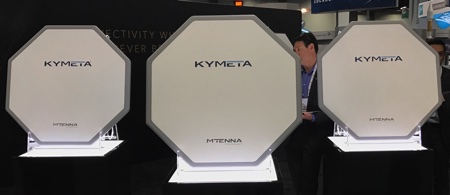After several years of investment and product development, Kymeta has unveiled the commercialized version of the company’s Ku-Band electronically scanned antenna based on metamaterials technology. The mTenna®, combined with Kymeta’s KyWay™ terminal, provides a satellite link for mobile platforms or stationary sites that lack terrestrial infrastructure.
The metamaterials-based antenna is planar, low profile, light weight and with a small footprint (28-in wide). A single aperture handles both transmit and receive. The system has manual and automatic modes for beam steering and setting polarization. Satellites are acquired using an application programming interface (API).
Nathan Kundtz, founder, president and CEO of Kymeta, explained that metamaterials technology enabled the design of a thin, light weight electronically steerable antenna with low power consumption. There’s probably little argument that electronic steering has multiple advantages over a mechanically steered antenna. The mTenna also beats an active electronically scanned array (AESA), according to Kundtz, because the mTenna is not as complex and will be less expensive.
Kymeta’s value proposition is to enable mobile platforms — aircraft, ships, rail cars, trucks — to access the significant data capacity available through satellites.
Kymeta announced the commercial availability of the system at the SATELLITE 2017 conference and said it will begin system trials in May and is taking “commercial reservations” to use the system. Kymeta also announced a satellite data service, branded KĀLO, that will use Kymeta’s ground terminals to access Intelsat’s fleet of geostationary satellites. KĀLO, which will become available during Q3 of this year, will provide “easy access” to Intelsat’s global satellite capacity and charge users for data used, with usage plans similar to familiar cell phone plans.
According to Geekwire, the monthly charge for the service will range from $29 for 1 GB to $899 for 80 GB. Bill Marks, the chief commercial officer for Kymeta, said this is “a fraction of the cost of satellite capacity today.” The upfront cost of the mTenna antenna and KyWay terminal will be $25,000.
Kymeta was founded in 2011 by Nathan Kundtz. The company has raised $124 million to fund product development and commercialization.

